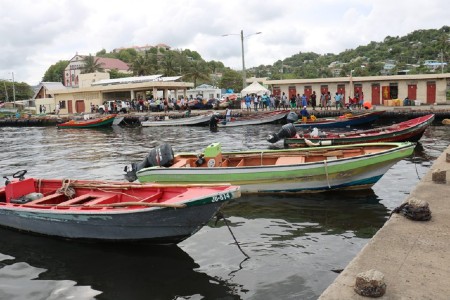Four Caribbean Countries to Benefit from FAO Fisheries Project
ROME, Italy – Four Caribbean Community (CARICOM) countries are to benefit from projects aimed at addressing land degradation, biodiversity and sustainability of marine resources, the Food and Agriculture Organization of the United Nations (FAO) has announced.
 Photo courtesy of the Caribbean Natural Resources InstituteIt said that Barbados, Trinidad and Tobago, Guyana and Suriname will benefit from the projects approved by the Global Environment Facility (GEF) n eight countries, totaling more than US$13.6 million in funding.
Photo courtesy of the Caribbean Natural Resources InstituteIt said that Barbados, Trinidad and Tobago, Guyana and Suriname will benefit from the projects approved by the Global Environment Facility (GEF) n eight countries, totaling more than US$13.6 million in funding.
The approvals were given during the 61st Meeting of the GEF Council, its main governing body, held virtually.
The latest projects will address urgent environmental challenges – such as land degradation and soil erosion, biodiversity loss, unsustainable fishing, and food production – that affect the food security and livelihoods of hundreds of thousands of people around the world.
“Preventing and reversing degradation is particularly important for transformation of global agrifood systems,” said FAO Director-General QU Dongyu.
“These projects are an important new effort to protecting and enhancing our resources to achieve better production, better nutrition, a better environment, and a better life for all.”
The latest projects to be approved by the GEF will assist countries and communities to restore degraded land and seascapes, to adopt more sustainable and climate-resilient practices and foster greater regional co-operation.
The projects to be implemented in partnership with and co-financed by the four CARICOM governments as well as Cabo Verde, Malaysia, Marshall Islands, and Thailand, will directly benefit more than 135,000 people and restore over 4,150 hectares of degraded landscapes.
“Overall management of more than five million hectares of land and marine habitats will be improved and 37,000 tons of over-exploited fish stocks will be moved to more sustainable levels, in a key initiative that coincides with the International Year of Artisanal Fisheries and Aquaculture 2022,” the FAO said.
Initiatives in the Caribbean will focus on supporting countries to enhance the food security, environment, and livelihoods of Small Island Developing States (SIDS), which face unique environmental challenges and have also been hard hit economically by the COVID-19 pandemic.
Barbados, Guyana, Suriname, Trinidad and Tobago will work together on a project aimed at reducing overfishing and to promote more responsible fisheries and marine conservation, while a project in the Marshall Islands aims to restore degraded forests and improve marine management in an effort to transform agrifood systems.
FAO is a partner agency of the GEF, a partnership of 18 agencies and 183 countries which addresses the world’s most challenging environmental issues related to biodiversity, climate change, land degradation, chemicals, and international waters. GEF provides grants to countries to meet these challenges whilst contributing to key development goals, such as food security.
Since December 2018, the FAO said it has mobilized more than $580 million in GEF grant funding for member countries, including the latest projects, benefitting over 4.6 million people and making FAO one of the top four GEF agencies globally.


